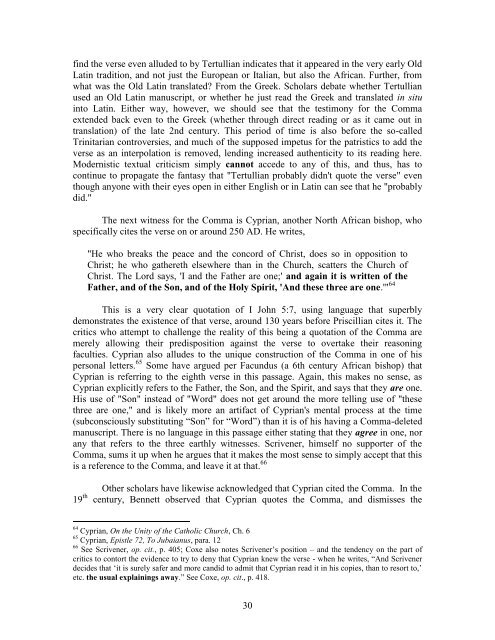A Defense of the Johannine Comma - Study to Answer.Net
A Defense of the Johannine Comma - Study to Answer.Net
A Defense of the Johannine Comma - Study to Answer.Net
You also want an ePaper? Increase the reach of your titles
YUMPU automatically turns print PDFs into web optimized ePapers that Google loves.
find <strong>the</strong> verse even alluded <strong>to</strong> by Tertullian indicates that it appeared in <strong>the</strong> very early Old<br />
Latin tradition, and not just <strong>the</strong> European or Italian, but also <strong>the</strong> African. Fur<strong>the</strong>r, from<br />
what was <strong>the</strong> Old Latin translated? From <strong>the</strong> Greek. Scholars debate whe<strong>the</strong>r Tertullian<br />
used an Old Latin manuscript, or whe<strong>the</strong>r he just read <strong>the</strong> Greek and translated in situ<br />
in<strong>to</strong> Latin. Ei<strong>the</strong>r way, however, we should see that <strong>the</strong> testimony for <strong>the</strong> <strong>Comma</strong><br />
extended back even <strong>to</strong> <strong>the</strong> Greek (whe<strong>the</strong>r through direct reading or as it came out in<br />
translation) <strong>of</strong> <strong>the</strong> late 2nd century. This period <strong>of</strong> time is also before <strong>the</strong> so-called<br />
Trinitarian controversies, and much <strong>of</strong> <strong>the</strong> supposed impetus for <strong>the</strong> patristics <strong>to</strong> add <strong>the</strong><br />
verse as an interpolation is removed, lending increased au<strong>the</strong>nticity <strong>to</strong> its reading here.<br />
Modernistic textual criticism simply cannot accede <strong>to</strong> any <strong>of</strong> this, and thus, has <strong>to</strong><br />
continue <strong>to</strong> propagate <strong>the</strong> fantasy that "Tertullian probably didn't quote <strong>the</strong> verse" even<br />
though anyone with <strong>the</strong>ir eyes open in ei<strong>the</strong>r English or in Latin can see that he "probably<br />
did."<br />
The next witness for <strong>the</strong> <strong>Comma</strong> is Cyprian, ano<strong>the</strong>r North African bishop, who<br />
specifically cites <strong>the</strong> verse on or around 250 AD. He writes,<br />
"He who breaks <strong>the</strong> peace and <strong>the</strong> concord <strong>of</strong> Christ, does so in opposition <strong>to</strong><br />
Christ; he who ga<strong>the</strong>reth elsewhere than in <strong>the</strong> Church, scatters <strong>the</strong> Church <strong>of</strong><br />
Christ. The Lord says, 'I and <strong>the</strong> Fa<strong>the</strong>r are one;' and again it is written <strong>of</strong> <strong>the</strong><br />
Fa<strong>the</strong>r, and <strong>of</strong> <strong>the</strong> Son, and <strong>of</strong> <strong>the</strong> Holy Spirit, 'And <strong>the</strong>se three are one.'" 64<br />
This is a very clear quotation <strong>of</strong> I John 5:7, using language that superbly<br />
demonstrates <strong>the</strong> existence <strong>of</strong> that verse, around 130 years before Priscillian cites it. The<br />
critics who attempt <strong>to</strong> challenge <strong>the</strong> reality <strong>of</strong> this being a quotation <strong>of</strong> <strong>the</strong> <strong>Comma</strong> are<br />
merely allowing <strong>the</strong>ir predisposition against <strong>the</strong> verse <strong>to</strong> overtake <strong>the</strong>ir reasoning<br />
faculties. Cyprian also alludes <strong>to</strong> <strong>the</strong> unique construction <strong>of</strong> <strong>the</strong> <strong>Comma</strong> in one <strong>of</strong> his<br />
personal letters. 65 Some have argued per Facundus (a 6th century African bishop) that<br />
Cyprian is referring <strong>to</strong> <strong>the</strong> eighth verse in this passage. Again, this makes no sense, as<br />
Cyprian explicitly refers <strong>to</strong> <strong>the</strong> Fa<strong>the</strong>r, <strong>the</strong> Son, and <strong>the</strong> Spirit, and says that <strong>the</strong>y are one.<br />
His use <strong>of</strong> "Son" instead <strong>of</strong> "Word" does not get around <strong>the</strong> more telling use <strong>of</strong> "<strong>the</strong>se<br />
three are one," and is likely more an artifact <strong>of</strong> Cyprian's mental process at <strong>the</strong> time<br />
(subconsciously substituting “Son” for “Word”) than it is <strong>of</strong> his having a <strong>Comma</strong>-deleted<br />
manuscript. There is no language in this passage ei<strong>the</strong>r stating that <strong>the</strong>y agree in one, nor<br />
any that refers <strong>to</strong> <strong>the</strong> three earthly witnesses. Scrivener, himself no supporter <strong>of</strong> <strong>the</strong><br />
<strong>Comma</strong>, sums it up when he argues that it makes <strong>the</strong> most sense <strong>to</strong> simply accept that this<br />
is a reference <strong>to</strong> <strong>the</strong> <strong>Comma</strong>, and leave it at that. 66<br />
O<strong>the</strong>r scholars have likewise acknowledged that Cyprian cited <strong>the</strong> <strong>Comma</strong>. In <strong>the</strong><br />
19 th century, Bennett observed that Cyprian quotes <strong>the</strong> <strong>Comma</strong>, and dismisses <strong>the</strong><br />
64 Cyprian, On <strong>the</strong> Unity <strong>of</strong> <strong>the</strong> Catholic Church, Ch. 6<br />
65 Cyprian, Epistle 72, To Jubaianus, para. 12<br />
66 See Scrivener, op. cit., p. 405; Coxe also notes Scrivener’s position – and <strong>the</strong> tendency on <strong>the</strong> part <strong>of</strong><br />
critics <strong>to</strong> con<strong>to</strong>rt <strong>the</strong> evidence <strong>to</strong> try <strong>to</strong> deny that Cyprian knew <strong>the</strong> verse - when he writes, “And Scrivener<br />
decides that ‘it is surely safer and more candid <strong>to</strong> admit that Cyprian read it in his copies, than <strong>to</strong> resort <strong>to</strong>,’<br />
etc. <strong>the</strong> usual explainings away.” See Coxe, op. cit., p. 418.<br />
30


